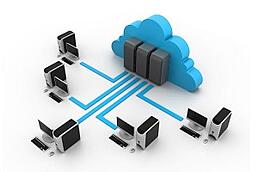Prior to the pandemic, many companies weren’t even considering migrating to the cloud. But COVID-19 made a few things abundantly clear: maintaining on-premise solutions places an undue burden on your IT team, and no matter how cutting-edge your servers and tools are, they typically can’t come close to matching the incredible computing power you can access in the cloud.
More and more organizations are making the migration, and for those who haven’t yet made the move, the question they’re asking typically isn’t if; it’s when. And “when” is as soon as it’s practical.
12 Reasons You Should Migrate to the Cloud

If your business has been struggling with constant change in the past few years, this may seem like a big one you can do without. But cloud computing represents the change that can make all future changes easier and less stressful. Put in those terms, it’s the one change you can’t live without.
1. Free Up Your IT Staff
Is your IT department so overworked with providing help desk support and other daily tasks that they struggle to update and patch software quickly? It’s a common issue, but one that sometimes has severe consequences. According to IBM’s 2021 X-Force Threat Intelligence Index, a third of all data breaches were the result of software that went unpatched. The Department of Homeland Security puts the number far higher, at around 85%. One of the best benefits of moving to the cloud is all of your tools and infrastructure will be updated automatically, which means your IT staff can sleep a bit easier at night, and focus on other matters.
2. Reduce Cost
Migrating to the cloud may mean you can do more without having to hire more full-time IT staff or invest in expensive hardware. You can just pay as you go, and most Cloud Service Providers (CSPs) charge a fairly low rate. You can also scale your services up or down as your needs change, so you aren’t stuck with a pricey tool that you no longer use.
3. Improve Security
Information stored in the cloud is typically much safer than information stored in individual devices or legacy systems. CSPs have invested heavily in security, and you can add more features easily. As your tools and infrastructure will be updated automatically, your risk of a data breach is far lower. However, should you ever need to recover from a disaster, if your data is backed up in the cloud, most of your recovery could be automated.
4. Enable Hybrid and Remote Work
In the cloud, your staff can share and edit documents, securely, from anywhere, and on any device. Cloud computing has made remote work sustainable over the long haul, and almost 73% of American office workers want to work remotely some or all of the time. Employers that enable remote work will have an easier time retaining staff and saving money on office space.
5. Improve Organization
Say goodbye to file names ending with “final final final.” With documents stored in the cloud, your staff won’t have to email files back and forth, and waste time tracking different versions.
6. Gain Flexibility
You won’t have to wait weeks to get new capabilities, so you can make big moves much faster. Get more of what you need on-demand, without any physical installation necessary.
7. Ditch Rigid Licensing
Tired of large up-front fees for software licenses? In the cloud, you can access the tools you want, when you want them, and in general, pay as you go.
8. Increase Revenue
With fewer costs, greater efficiency, speed, and agility typically comes increased revenue. According to McKinsey, all major industries that switch to the cloud have the potential to increase revenue by more than 20%.
9. Fewer Growing Pains
Mergers and acquisitions, as well as rapid growth, can be a mixed blessing. However, the cloud makes big changes much easier to manage with auto-scaling and simpler data management.
10. Access More Data
Anyone can make decisions quickly. But if you’re not using the sophisticated tools available in the cloud, it’s fairly difficult to make well-informed decisions at high speed. The cloud gives you access to advanced data analytics to help you manage your relationships with customers and more, so you can gain confidence around quick decision-making.
11. Cut Your Carbon Footprint
Data centers require a lot of energy. Not only does the average private data center use less environmentally-friendly sources of energy than a large cloud provider, but it’s also typically far less efficient.
12. Level the Playing Field
With the cloud, even smaller startups can get cutting-edge technology. The promise of fair marketplace competition, where innovation can’t be muscled out, is much closer to reality.
What Should You Know Before Migrating to the Cloud?
Once you migrate to the cloud, changes get much easier to manage. But migrating there can be a significant undertaking. Depending on your cloud migration strategy, it could be time-consuming, and there is always a risk you could lose some data in transit.
Getting Help With a Cloud Migration
Even if your IT team is fully capable of handling a migration, it may be better for your entire organization to keep them focused on other matters. Many managed IT service providers like Marco are happy to lend a hand with cloud migrations and other large projects. Our experts can help you identify the best migration strategy and put it into action quickly, so there’s far less downtime, and your data will be better protected.
